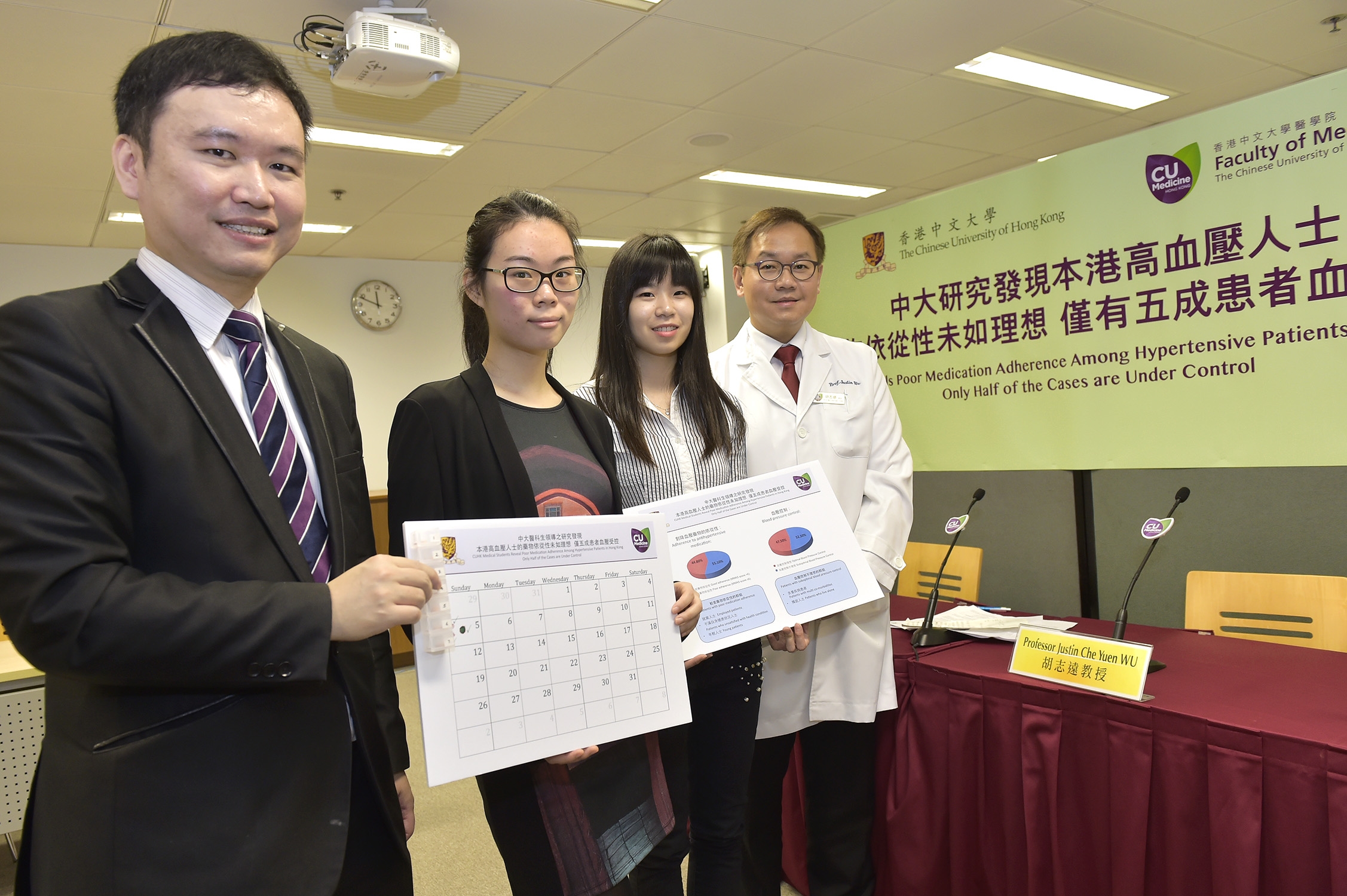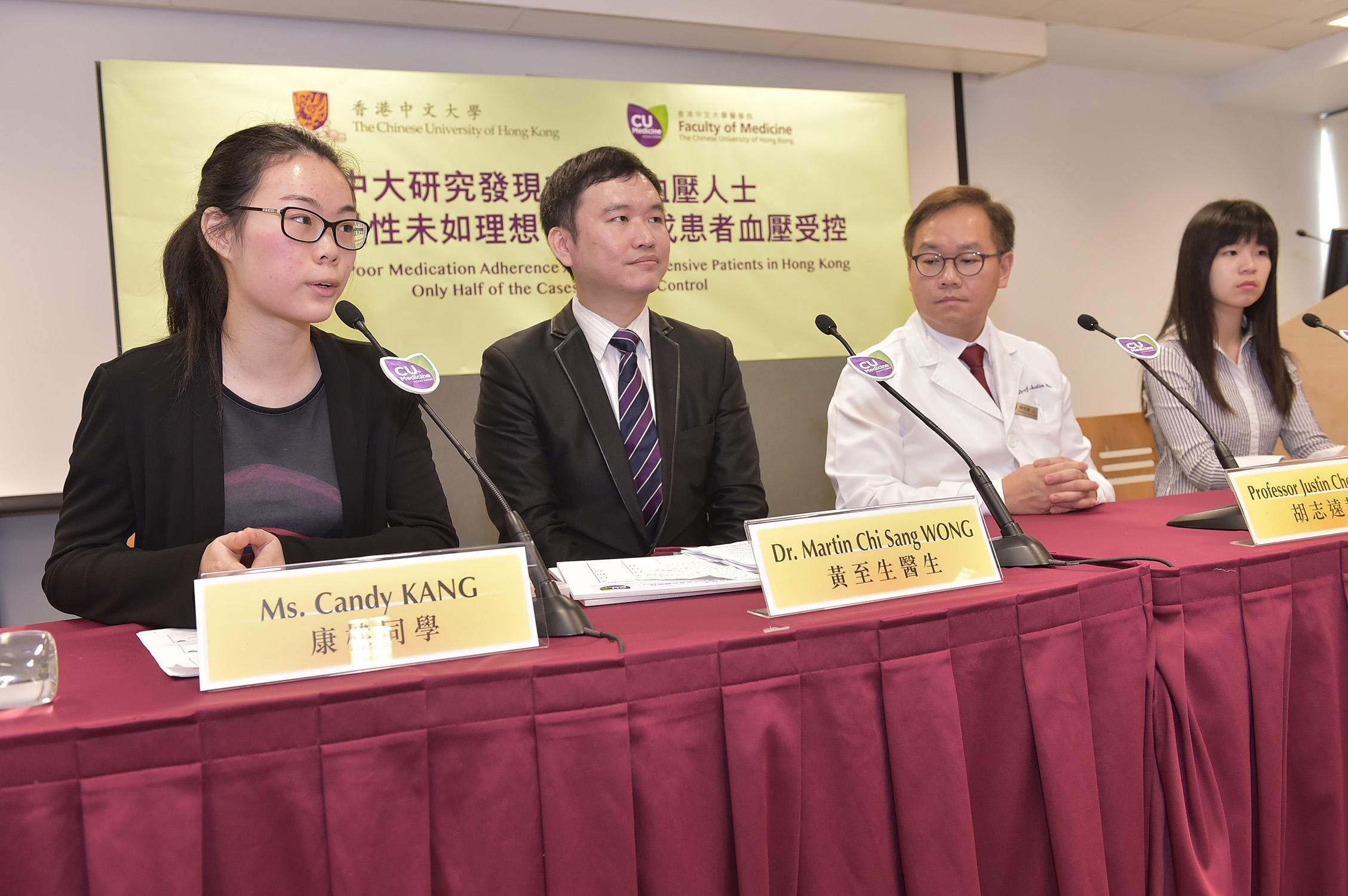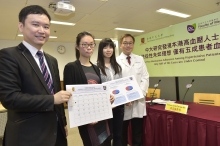CUHK
News Centre
CUHK Research by Medical Undergraduates Reveals Poor Medication Adherence Among Hypertensive Patients in Hong Kong
Hypertension is a common chronic disease affecting 40% of the world’s population. Up to date, there is 11% of local population diagnosed with hypertension, though it is estimated that the actual prevalence should be one-third of local adult population according to a recent study. The Jockey Club School of Public Health and Primary Care, Faculty of Medicine at The Chinese University of Hong Kong (CUHK) has recently conducted a research on medication adherence and blood pressure control in Hong Kong hypertensive patients. The result indicated that 45% of the participants had unsatisfactory medication adherence while only 50% of them had their blood pressure under good control. The research also indicated that patients who were employed, unsatisfied with their own health conditions and younger had poor medication adherence when compared with the others. It is suggested that more resources should be allocated to enhance medication adherence and blood pressure management among hypertensive patients through community health education programme. The findings has been published in a leading international medical journal, International Journal of Cardiology.
As high blood pressure is able to trigger a wide range of cardiovascular diseases, it brings heavy economic burden and healthcare cost which ranks no.2 among chronic diseases. Therefore, effective management of hypertension is a very important healthcare issue while good adherence to antihypertensive medication is the key of blood pressure control. It also prevents patients from complications and reduces healthcare burden to the society.
In view of this, Dr. Martin Wong, Associate Professor, the Jockey Club School of Public Health and Primary Care, Faculty of Medicine, CUHK and two medical students from the Global Physician-Leadership Stream, Ms. Prilla Tsang and Ms. Candy Kang, conducted a research on medication adherence and blood pressure control in Hong Kong hypertensive patients in 2014. To ensure the data accuracy and reliability, the research team recruited hypertensive patients randomly from four public outpatient clinics in Hong Kong and measured their medication adherence with the well-known ‘8-item Morisky Medication Adherence Scale’.
There were 2,455 hypertensive patients with a mean age of 65.5 years old participating in the research, of whom 56% were female. The results indicated that 45% of the participants had unsatisfactory medication adherence while only 50% of them had their blood pressure under good control. The research also showed that patients who were employed, unsatisfied with their own health conditions and younger had poor medication adherence when compared with the others.
|
|
Good medication adherence |
|
Good medication adherence |
|
Employed |
48.1% |
Unemployed / retired |
57.8% |
|
Unsatisfied with health condition |
42.9% |
Satisfied with health condition |
61.8% |
|
Young (under 50 years old) |
44.3% |
Elderly (>70) |
60.6% |
Ms. Prilla Tsang, medical student participated in the research, explains, ‘Tight working schedule in Hong Kong may cause difficulty for employed patients to follow a regular medication schedule. In addition, we found that patients who are unsatisfied with their own health conditions and younger have poor medication adherence which are consistent with previous oversea studies. One possible reason is that the former have poor self-control and negative attitude towards hypertension, therefore they are not willing to take medicine as prescribed.’
Ms. Candy Kang, another medical student, continues, ‘Besides medication adherence, the study also reflected unsatisfactory blood pressure management in Hong Kong, especially patients with multiple co-morbidities (43.9%) and those who are living alone (47.8%). Hypertensive patients are advised to use simple methods such as drug boxes and calendars to remind themselves to follow medication instructions. Support from family and healthy lifestyle also plays a vital role in blood pressure management.’
Dr. Martin Wong concludes, ‘We suggest the Government to allocate more resource on educational programme targeting groups with poor medication adherence. Regarding those hypertensive patients who are living alone and suffering from multiple co-morbidities, healthcare providers should enrich the patients with knowledge of blood pressure management and help them develop a positive attitude towards the disease, while pharmacists are encouraged to cooperate with physicians on regular blood pressure monitoring and medication adherence follow-up in order to improve blood pressure control in hypertensive patients.’
The Faculty of Medicine is dedicated to nurturing future researchers. Its undergraduates are provided with research knowledge and opportunities throughout the medical curriculum. Ms. Prilla Tsang and Ms. Candy Kang, both year 3 medical students of the Global Physician-Leadership Stream, are the first two undergraduate students in Hong Kong listed as co-first authors in an international leading journal. They are glad to join the research in which they have gained a better understanding of medical research methodology and its importance. Prof. Justin Wu, Associate Dean (Development) and Director of the Global Physician-Leadership Stream, Faculty of Medicine, CUHK remarks, ‘We are proud of the outstanding performance of Prilla and Candy. Participating in medical research not only equips students with analytic and problem solving skills, but also enables them to acquire knowledge from various aspects.’ Up to date, more than 30 medical students in the Faculty are conducting a wide range of research projects with their professors.
(From left) Dr. Martin Wong, Associate Professor of The Jockey Club School of Public Health and Primary Care; Ms. Candy Kang and Ms. Prilla Tsang, students from the Global Physician-Leadership Stream; and Prof. Justin Wu, Director of the Global Physician-Leadership Stream, Faculty of Medicine, CUHK share research findings on poor medication adherence and blood pressure control among hypertensive patients in Hong Kong.







